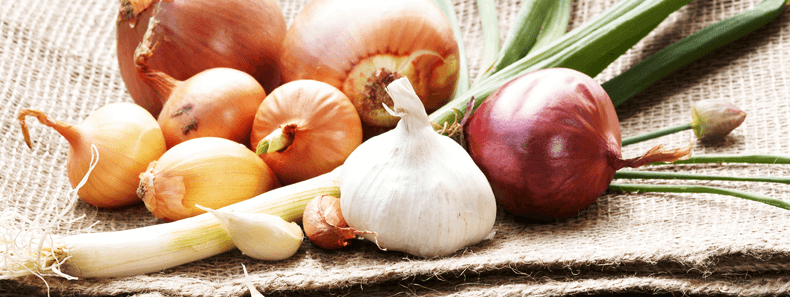Allium Intolerance | Symptoms and Testing

Allium intolerance is a condition where a person has difficulty digesting or metabolizing allium-containing foods. Alliums are a family of vegetables that include onions, garlic, leeks, shallots, and chives. Allium intolerance is often confused with a garlic intolerance, but it can be triggered by any of the vegetables in the allium family.
Symptoms of allium intolerance can include bloating, gas, stomach pain, diarrhea, and vomiting. These symptoms typically occur within a few hours of consuming allium-containing foods.
The exact cause of allium intolerance is not well understood, but it may be due to the presence of fructans, a type of carbohydrate found in alliums. Fructans can be difficult to digest for some people and can lead to symptoms of bloating and gas.
If you suspect you have an allium intolerance, it's important to speak with a healthcare professional to confirm the diagnosis and rule out any other underlying conditions. Treatment typically involves avoiding allium-containing foods and working with a registered dietitian to ensure a nutritionally balanced diet.
What are the most common symptoms of an Allium intolerance
The most common symptoms of an allium intolerance include:
Bloating: Allium intolerance can cause bloating, which is a feeling of fullness and swelling in the abdomen.
Gas: Allium intolerance can lead to increased gas production, which can cause discomfort and flatulence.
Stomach pain: Allium intolerance can cause stomach pain or cramping.
Diarrhea: Allium intolerance can cause loose, watery stools.
Nausea and vomiting: In some cases, allium intolerance can cause nausea and vomiting.
These symptoms usually occur within a few hours of consuming allium-containing foods, but the onset and severity can vary depending on the individual. If you experience any of these symptoms after consuming alliums, it's important to speak with a healthcare professional to confirm the diagnosis and develop an appropriate management plan.
What’s The Difference Between An Allium Intolerance And An Allium Allergy?
An allium intolerance and an allium allergy are two different conditions with different underlying causes and symptoms.
An allium intolerance is a condition where a person has difficulty digesting or metabolizing allium-containing foods, such as onions, garlic, leeks, shallots, and chives. This can lead to symptoms such as bloating, gas, stomach pain, diarrhea, and vomiting. Allium intolerance is typically caused by the presence of fructans, a type of carbohydrate found in alliums.
On the other hand, an allium allergy is a condition where a person's immune system reacts abnormally to proteins found in allium-containing foods. This can trigger a range of symptoms, including hives, itching, swelling, difficulty breathing, and anaphylaxis, which is a severe and potentially life-threatening allergic reaction. Allium allergy is much less common than allium intolerance.
In summary, an allium intolerance is a digestive issue caused by difficulty digesting or metabolizing alliums, while an allium allergy is an immune system response to proteins found in alliums. If you suspect you have an allium intolerance or allergy, it's important to speak with a healthcare professional to confirm the diagnosis and develop an appropriate management plan.
Which Foods To Avoid With An Allium Intolerance
If you have an allium intolerance, you may need to avoid or limit foods that contain alliums, which include:
- Onions
- Garlic
- Leeks
- Shallots
- Chives
- Scallions
- Spring onions
- Garlic powder
- Onion powder
- Dehydrated onions
- Pickled onions
-
Onion salt
Some people with allium intolerance may be able to tolerate small amounts of alliums in their diet, while others may need to avoid them completely. It's important to work with a registered dietitian to ensure that you are still getting all the nutrients you need and to identify alternative sources of flavour and nutrition.
It's also important to read food labels carefully, as alliums can be found in a wide range of foods, including soups, sauces, marinades, and seasoning blends. Many processed foods also contain alliums, so it's important to be mindful of what you are consuming.
What To Eat If You Have An Allium Intolerance
If you have an allium intolerance, you may need to avoid or limit foods that contain alliums, which can make it challenging to achieve a balanced and varied diet. However, there are still many nutritious and flavorful foods you can eat. Here are some examples of foods you can include in your diet:
Vegetables: There are many non-allium vegetables you can eat, such as broccoli, cauliflower, carrots, zucchini, cucumbers, tomatoes, spinach, kale, and lettuce.
Herbs: There are many herbs you can use to add flavor to your meals, such as parsley, basil, cilantro, oregano, thyme, and rosemary.
Spices: Spices can also add flavor to your meals, such as cumin, turmeric, paprika, and cinnamon.
Fruits: Fruits are a great source of vitamins and minerals, such as apples, oranges, bananas, berries, and grapes.
Grains: There are many grains you can eat, such as rice, quinoa, oats, and corn.
Protein sources: You can also include protein sources such as eggs, chicken, fish, tofu, and beans.
It's important to work with a registered dietitian to ensure that you are still getting all the nutrients you need and to identify alternative sources of flavor and nutrition. They can help you create a well-rounded and satisfying meal plan that meets your nutritional needs and food preferences while avoiding allium-containing foods.
